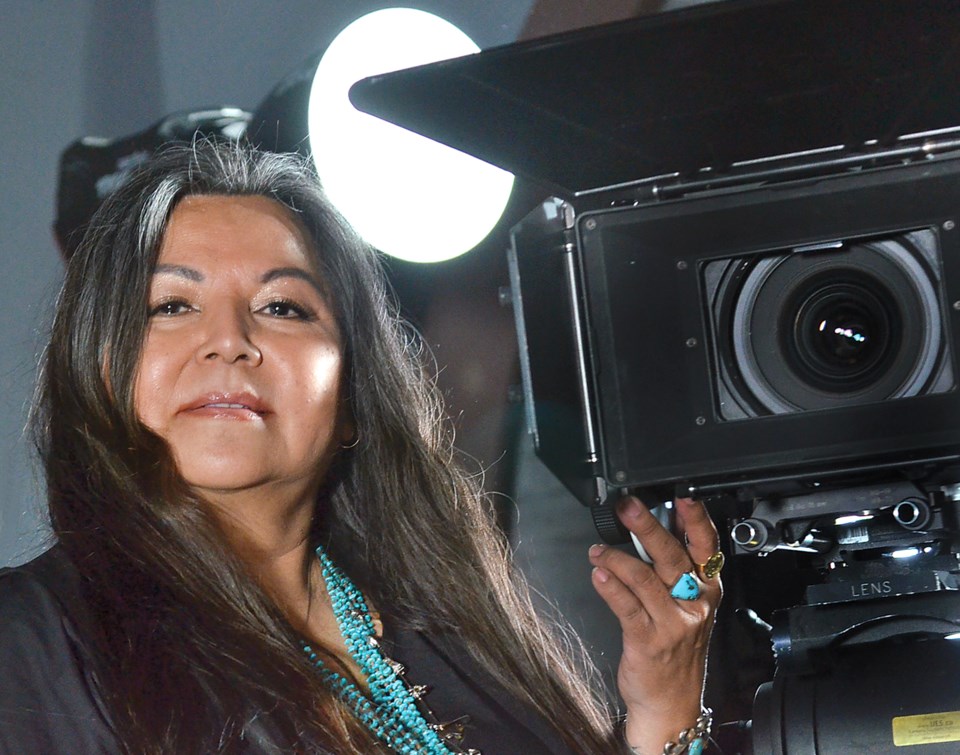In almost four decades of tireless work, Doreen Manuel has rarely stopped to reap the rewards of her own success. The award-winning Secwepemc/Ktunaxa First Nations filmmaker and Capilano University teacher is not one to rest on her laurels, in fact she seldom acknowledges her own achievements at all – mighty as they are.
When Manuel discovered she would be the recipient of Capilano University’s Enduring Award, one of five awards celebrating positive community impact as part of the university’s Alumni Awards of Excellence, she was shocked. Her endeavours may be impressive to other people, she says, but to her it’s simply “all in a day’s work.”
“I don’t really think about all the different things I’ve accomplished here, and out in the filmmaking industry, because I just stay busy,” she said.
“I keep on doing new things all the time, and I don’t ever really stop to think about what each thing means in the greater sense. This is nice, it’s forced me to look back on what I’ve achieved, and I suppose it really has been a lot.”
For someone who boasts 19 years of experience in the film industry and 37 years of experience in teaching, “a lot” would be putting it mildly.
Her film resume is long and impressive: she owns production company Running Wolf Productions, is on the board for the Knowledge Network and the Vancouver International Film Festival, and is an instructor and initiator of the Women in Film & Television Tricksters and Writers screenwriting program.
Yet it is her work as an educator at the university that is arguably most notable of all. Since joining the facility in 2005, Manuel has spearheaded several successful programs that champion Indigenous storytelling and reshape the opportunities available to Indigenous communities within the film industry.
Through the Indigenous Digital Filmmaking program, Manuel has redesigned an entire school curriculum, one built around traditional Indigenous teaching methods. She says the introduction of some of these methods has been so well received, other faculties are looking to implement them.
“A lot of people are talking about utilizing the circle form of education, which is one of the simpler pieces involved,” she said, describing a new approach to classroom dynamics which sees students and staff sitting in a circle, facing one another, rather than in front-facing rows.
“People will probably wonder what difference it makes, but there are things that happen naturally and values that come out when we gather in a circle, as opposed to the traditional roles in a classroom, that we aren’t even psychologically aware of,” she said.
“If you’re face to face as people, you tend to just naturally, psychologically, feel a responsibility to your behaviour, actions, values and feelings that you’re sharing in that classroom. That’s Indigenous – we always have met in a circle for exactly those reasons.”
As a residential school survivor, Manuel says she wants to create learning opportunities for Indigenous students that weren’t available to her when she was younger. Those opportunities begin in the classroom, with her implementation of those traditional and cultural methods, and extend beyond it, with other programs like the Digital Accelerator, a program she founded which provides further resources like funding and personal mentorship.
Brittany Barnes, chair of the Capilano University Alumni Association, said Manuel’s work with the university has served as a “pivotal piece” of the reconciliation conversation.
“What we really wanted to do with these awards was make sure that we’re honouring and profiling and celebrating alumni who have been doing work to foster relationships with Indigenous communities,” she said.
“That is something Doreen has been doing day in and day out with her own work. When we talk about reconciliation, that really means learning histories that we wouldn’t know otherwise, and Doreen brings that to the forefront of the conversation, and under the umbrella of how we treat each other on a basic human rights level,” she said.
Manuel, whose father is political leader Grand Chief George Manuel, the founding president of the World Council of Indigenous Peoples who was instrumental in the creation of the Universal Declaration of the Rights of Indigenous Peoples, said the knowledge that she is impacting so many students is what keeps her plowing on ahead with her work.
“I’ve had students come up to me who I worked with 20 years ago who told me that I have saved their life, because I taught them to appreciate our history, and through that they found their identity,” she said.
“The greatest thing that I can do for these students is to be a good role model.”
At age 63 Manuel is approaching retirement, yet she says there are no plans to slow down anytime soon. Following the awards ceremony at The Polygon Gallery April 12, she said she’ll be, as always, looking to the road ahead.
“I don’t know if people like me actually retire. There are still programs I would like to see developed, I’m still pitching ideas. There is so much need, and where there is need, there needs to be vision.”
Mina Kerr-Lazenby is the North Shore News’ Indigenous and civic affairs reporter. This reporting beat is made possible by the Local Journalism Initiative.




